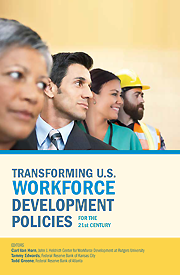
The world of work has been turned upside down. A confluence of forces—including globalization, pervasive and rapid technological change, and the rise of temporary work—has whipsawed workers and employers alike.
It was not always so. For much of the 20th century, a high-school diploma was a ticket to a middle-class living for most Americans. That's no longer true. How the nation reconstructs that opportunity is one of today's foremost economic questions, says Dave Altig, executive vice president and research director of the Federal Reserve Bank of Atlanta.

To explore that question, the Atlanta Fed has undertaken a broad research and policy agenda. This work includes a new book compiled by the Atlanta and Kansas City Feds, in partnership with Rutgers University. Transforming U.S. Workforce Development Policies for the 21st Century examines the complex challenges facing the nation's workforce development ecosystem and aims to influence both policy and practice. (The book was officially launched October 29 at the Federal Reserve Board of Governors building in Washington DC, and video of the event is available.) Panel discussions by leading workforce development practitioners and researchers explored some of the topics detailed in the new book.
Outdated policies and programs are insufficient
The book's 30 chapters offer fresh approaches to local, regional, state, and national policies and programs. More than two dozen practitioners, scholars, and policymakers contributed perspectives meant to further conversation about the elements of "a robust and effective workforce development system," write the book's editors, Todd Greene of the Atlanta Fed, Tammy Edwards of the Kansas City Fed, and Carl Van Horn of the John J. Heldrich Center for Workforce Development at Rutgers University.
"Our country's workforce development policies and programs were largely developed more than 30 years ago and are insufficient to address the needs of our modern economy," according to the foreword by Atlanta Fed President Dennis Lockhart and Kansas City Fed President Esther George.
The new book should serve as a valuable tool for business leaders and policymakers as they seek to reshape policies and programs. "It provides practical examples of exemplary policies that can help meet the needs of both workers and employers," said John Engler, president of the Business Roundtable and former governor of Michigan.
Marc Morial, president and CEO of the National Urban League, noted that the book's authors "offer solutions that can help both today's workforce and the workers who will build our economy in the future."
 Left to right: Todd Greene, vice president of the Atlanta Fed's Community and Economic Development department; Jay Moon, president and CEO, Mississippi Manufacturers Association; Terri Sterling, chief operating officer, Our Lady of the Lake Regional Medical Center, and chair of the Atlanta Fed's New Orleans Branch board of directors; and John Engler, president, the Business Roundtable and former governor of Michigan.
Left to right: Todd Greene, vice president of the Atlanta Fed's Community and Economic Development department; Jay Moon, president and CEO, Mississippi Manufacturers Association; Terri Sterling, chief operating officer, Our Lady of the Lake Regional Medical Center, and chair of the Atlanta Fed's New Orleans Branch board of directors; and John Engler, president, the Business Roundtable and former governor of Michigan.
Not investing is more expensive than investing
A fundamental point of the book: failing to invest in workforce development is more costly to the nation than investing in it. Societal costs—through increased demand for social supports and missed opportunity for productive work by millions of people—are enormous, write Larry Good and Ed Strong of the Corporation for a Skilled Workforce. "Without a workforce development public policy and investment strategy," they write, "the United States faces the prospect of an increasingly two-tier economy in which some prosper and others are left with little hope for self-sufficiency."
Transforming U.S. Workforce Development Policies for the 21st Century suggests strategies to help guide the nation toward a better future. The book does so in four distinct parts:
- "Transforming the U.S. Workforce Development System" analyzes workforce policies for workers. This section pays particular attention to the needs of the long-term unemployed, minority adults, people with limited education, and others who tend to face difficult employment prospects.
- "Redesigning Workforce Development Strategies" proposes ideas to transform education and workforce programs to better serve employers and job seekers. Authors explore topics including reforming unemployment insurance, restructuring postsecondary education financial aid programs, and improving credentialing systems.
- "Building Evidence-Based Policy and Practice" examines how collecting and analyzing data is bolstering state and local workforce programs. Chapters cover various aspects of the ways in which richer data are being employed to judge what does and doesn't work.
- "Targeted Strategies" focuses on effective state and local programs and considers how those practices might be propagated across the country. Authors relate stories about initiatives focused on teens, adults over 50, women in nontraditional occupations, and multiple generations within families.
Setting the context for the chapters that follow, Greene, Edwards, and Van Horn note that many big employers are increasingly embracing temporary contract and contingent work arrangements. Consequently, employers invest less in workers' education and training, leaving more of that responsibility to the individual worker.
"There is an urgent need to address the long-simmering crisis in the American workforce that has become less equitable and tougher on those without advanced education," the editors write. "The core challenge is how to educate, train, and retrain people so that they can achieve their full potential and offer employers valuable skills."
The work continues. In the wake of the book's release, the Atlanta Fed's Stuart Andreason, a senior adviser in the Atlanta Fed's Community and Economic Development department and an expert on workforce development, will write a series of mini-books exploring the same issues.




